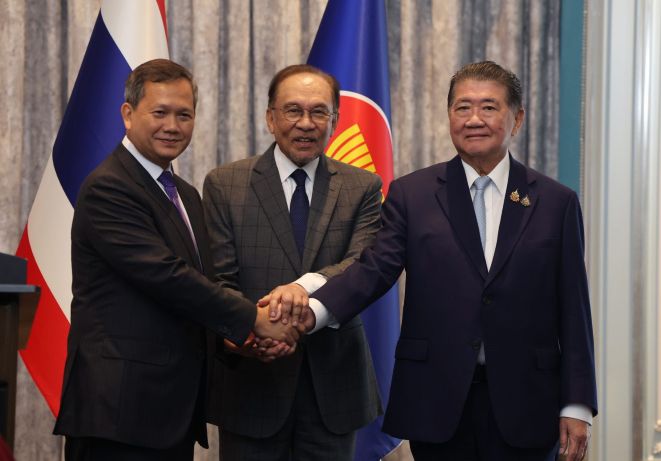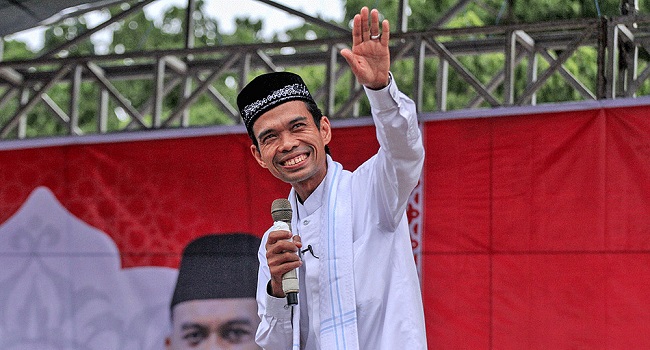Anwar or Trump: Who Stopped the War Between Thailand And Cambodia?

Malaysian Prime Minister and ASEAN Chair Anwar Ibrahim (center) shakes hands with Cambodian Prime Minister Hun Manet (left) and Thai Acting Prime Minister Putham Vejjachai (right)
<Photo = Xinhua News/Yonhap News>
By Ivan Lim,
Former Senior Reporter at The Straits Times, Singapore
SINGAPORE: The poser: do we credit Anwar Ibrahim or Donald Trump for the surprise cease-fire that halted Thailand and Cambodia from the brink of full-scale war?
Thus far, the midnight July 28 truce appears to be holding.
To start with, the Malaysian Prime Minister was the face of the peace-maker, stepping into the conflict five days into the fighting to get acting Thai Prime Minister Phumtham Wechayachai and Cambodian Prime Minister Hun Manet to start talks.
Next, the US President asserted that he pushed the two parties to talk by threatening to scuttle their tariff negotiations if they continue their feud.
And his spokesman claimed that he, thereby, deserves the Nobel Peace Prize.
Not to be overlooked, though, was the behind-the-scene role of the Chinese ambassador, who was present in the Putraya dialogue hosted by Anwar.
China, having extensive trade ties with Thailand and being a close ally of Cambodia, had weighed in with calls for dialogue to de-escalate the border conflict.
On his part, the man of the hour neither crowed nor glowed over the positive outcome of his mediation efforts. Instead, he said the truce accord was “concrete evidence of Asean diplomatic strength”
As the Asean chair, he was offering his good offices as a neutral platform for the disputing neighbours to step back without losing face.
This, given the rising popular nationalist feelings on both sides, was an astute move.
Bangkok and Phnom Penh had also gotten nowhere in their attempts to lower tensions, the former preferring to hold bilateral talks while the latter sought to go to the International Court of Justice (ICJ). ICJ had ruled that the Hindu temple of Preah Vihear, claims over which had roused emotions on both sides, belonged to Cambodia.
Consider also the fallout between suspended Thai Prime Minister Paetongtarn Shinawatra and Cambodian President Hun Sen in their abortive personal efforts to smooth over the border tensions.
In contrast, Anwar brokered the talks in the larger context of Asean’s commitment to peace and solidarity and thereby offered both parties the political space to maneuver and seek reconciliation, according to analysts.
And that was a feat that only a seasoned and adept political stalwart could pull off in a delicate situation.
Observers have hailed the ceasefire as a diplomatic coup for Anwar, enhancing his growing status as a statesman.
To be sure, the historic ceasefire is seen as only the beginning of the end to the conflict.
Going forward, the 10-member Association of South-east Asia Nations is poised to beef up the multi-national taskforce overseeing the implementation of the truce on the ground.
Acting in league with US and China, the grouping, said analysts, could strengthen its mechanism for disputing parties to resolve differences within the Asean code of peace and unity.
Given the growing US-China rivalry for influence in South-east Asia, Asean member-states will see more purpose and benefits in subscribing to the concept of Asean centrality and solidarity.
For example, Asean is negotiating with China on a code of conduct for handling territorial claims in the South China Sea.
It remains to be seen, whether Asean success in forging the Thai-China ceasefire will impact the stance of the ruling junta in Myanmar, a member-state, towards working with Asean to resolve its raging civil war.
Critics have panned Asean for the lack of progress in pressuring the ostracised Senior General Min Aung Hlaing, who overthrew Aung Sun Suu Kyi in a coup in 2021, to deal seriously with its special envoy in mediating a settlement based on its Five-Point Consensus plan.
Will Anwar now turn his attention to Myanmar?
And with Trump resorting to his tariff threats, the Asean chair might be able to jump-start the stalled Myanmar peace talks.



